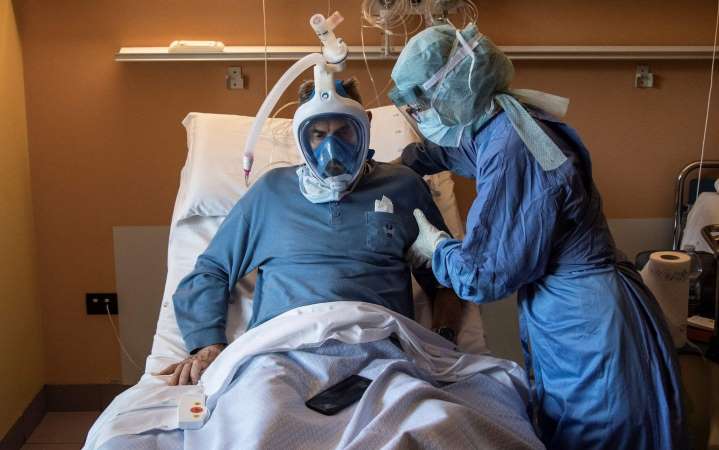
After initial success, Singapore and Taiwan grapple sudden COVID surge
It was only three weeks ago, in the last week of April, that Bloomberg ranked Singapore the “world’s best place to be” during the pandemic. “The tiny city-state has got locally transmitted cases down to near zero thanks to border curbs and a strict quarantine programme, allowing citizens to largely go about their everyday lives… At the same time, Singapore has already administered vaccines equivalent to cover a fifth of its population…” Bloomberg said in its report

Two of Asia’s biggest financial centres, which were until recently being hailed as virus success stories, are grappling with a sudden rise in COVID-19 cases.
Singapore and Taiwan, both poster child of pandemic success, saw zero or single-digit COVID cases since the start of the year. But now authorities in both places have imposed strict restrictions after a spurt in cases – nearly 250 in Singapore’s case and 1,200 in Taiwan’s.
‘World’s best place to be’
It was only three weeks ago, in the last week of April, that Bloomberg ranked Singapore the “world’s best place to be” during the pandemic. “The tiny city-state has got locally transmitted cases down to near zero thanks to border curbs and a strict quarantine programme, allowing citizens to largely go about their everyday lives… At the same time, Singapore has already administered vaccines equivalent to cover a fifth of its population…” Bloomberg said in its report.
However, a COVID cluster that emerged in Singapore’s Changi Airport has now completely changed the scenario. Per the BBC: “Authorities later found out that a number of infected airport staff had been working in a zone that received travellers from high-risk countries, including those in South Asia.
Also read: As cases of mucormycosis rise, cost of anti-fungal injection skyrockets 10-fold
“Some of these workers then went on to have their meals in the airport’s food courts – which are open to members of the public – further spreading the virus…
“Many of those infected were later found to have the highly contagious variant that first surfaced in India – known as B.1.617.”
In fact, the developments in Singapore have had an unintended effect: Delhi Chief Minister Arvind Kejriwal on Tuesday tweeted, without providing any evidence, that a new variant found there is said to be extremely dangerous for children.
Singapore’s health ministry immediately issued a rebuttal. “There is no new ‘ Singapore’ variant of COVID-19. Neither is there evidence of any COVID-19 variant that is ‘extremely dangerous for kids,’” it said.
Singapore has now said it will segregate flights from high-risk regions. Airline/airport staff and passengers will also be ring-fenced and segregated by zones.
One expert told the BBC that it was “inevitable” that the Indian variant would have found its way into Singapore, given the city-state’s position at the cross-roads of global trade and commerce.
“I understand why people are feeling frustrated because the majority of Singaporeans have been extremely compliant,” said Prof Teo Yik Ying, dean of the NUS School of Public Health. “But we are not like China which can keep its borders completely shut. Our reputation as a country, our economy, is linked to our position as a trade hub.”
Complacency and lack of testing
In Taiwan too the outbreak has been linked to international travellers – specifically a handful of China Airlines pilots who had been staying at a Novotel near Taoyuan Airport. Many of those linked to this cluster were later found to have contracted the UK variant of the coronavirus, known as B.1.1.7.
Almost as soon as China reported the emergence of the virus last year, Taiwan issued an immediate ban on foreign visitors, and the ban is still largely in place a year on. However, according to reports in the foreign media, including the BBC, the government and health authorities started to become complacent and hospitals stopped aggressively testing people. According to Our World in Data, Taiwan was administering just 0.57 virus tests per 1,000 people in mid-February, compared to Singapore’s rate of 6.21 and the UK’s rate of 8.68 at around the same period.
“Doctors were not taking it seriously, hospitals were not alert, they were not doing a lot of contact tracing. There was definitely a certain sense of complacency,” Associate Professor Lin Hsien-ho of the National Taiwan University told the BBC.
The government also relaxed its quarantine requirements for non-vaccinated airline pilots from an initial 14-day period, to five days, and then just three days. Shortly afterwards, the country reported the cluster associated with China Airlines pilots.
The virus then spread through the community, eventually making its way to Taiwan’s “tea houses” – adult entertainment venues that attract a large number of people.
It provides another reminder that even when a very small proportion of the population breaks the rules, it will lead to leakages, Dr Chen said.


